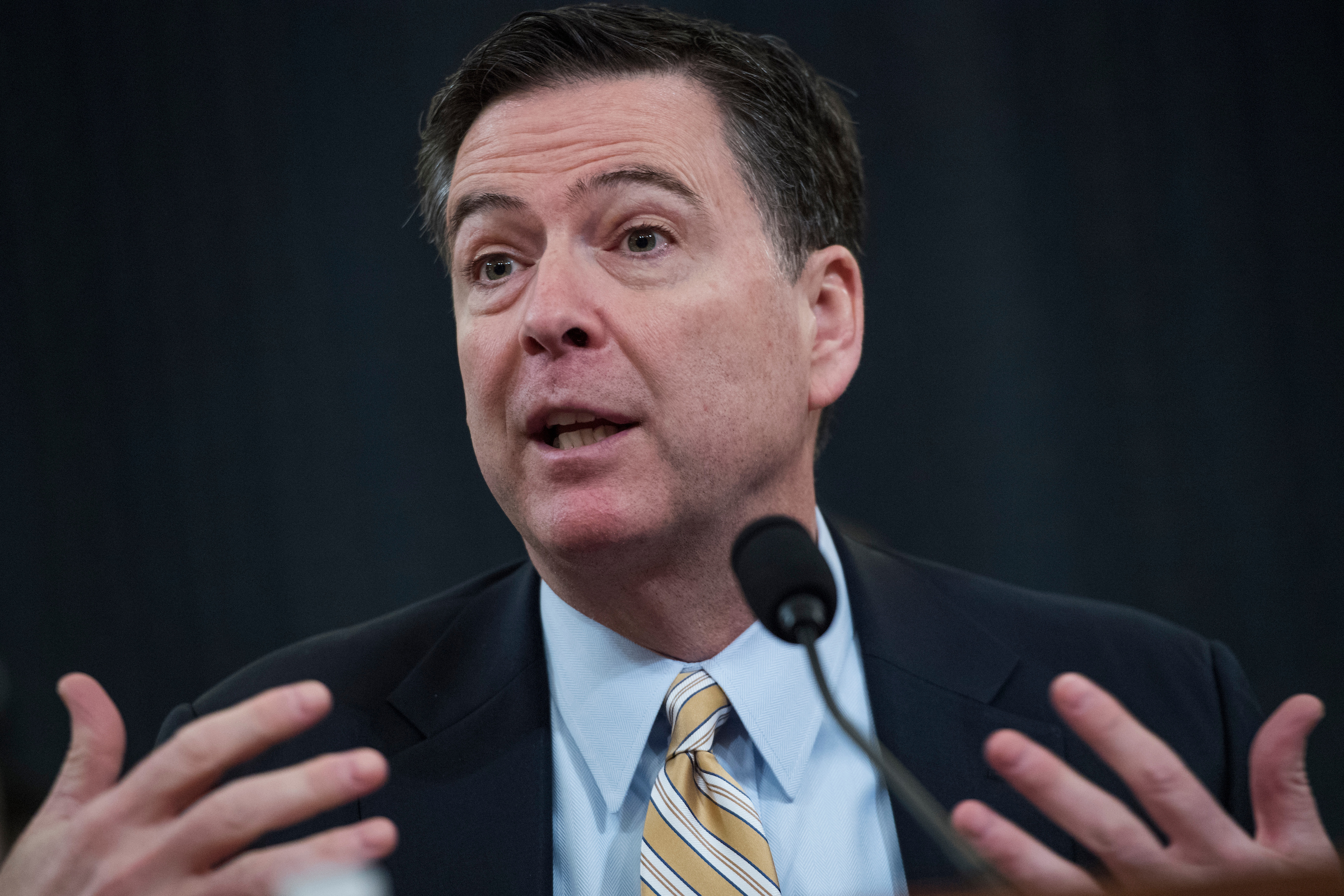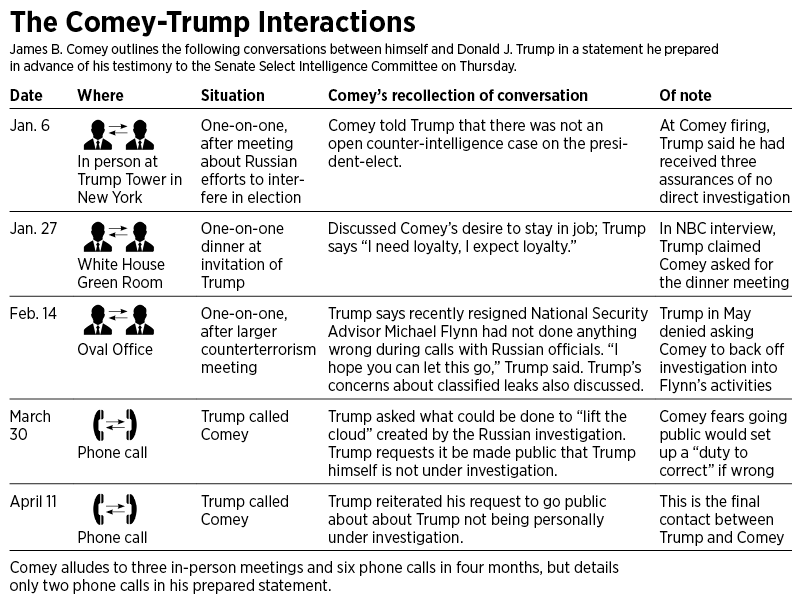As Comey Testifies, Trump’s Presidency Hangs in Balance
White House looks to Senate Intel Republicans for cover

It has been decades since Washington has seen anything like the maelstrom that will consume the capital city — and, perhaps, Donald Trump’s presidency — on Thursday when James B. Comey appears before the Senate Intelligence Committee.
The testimony of the former FBI director, whom Trump fired after allegedly asking him to drop a federal investigation of his first national security adviser, will be watched around the world. Not since the 1987 Iran-Contra and 1973 Watergate hearings will so much attention be on Republican and Democratic members as they question — and criticize — a witness.
Senate Intelligence members will be looking to get to the bottom of whether Trump might have inappropriately interfered in the FBI’s ongoing investigation of Russia’s 2016 presidential election meddling. More pointedly, the hearing is expected to shed light on whether the sitting president of the United States might have obstructed justice during his conversations with Comey — and perhaps other senior law enforcement and national security officials.
The stakes are high for the 15 Republican and Democratic members who will be seated around the dais.
GOP senators must appear to be pursuing the truth while avoiding the appearance that they are there solely to discredit Comey and provide political cover to Trump, no matter how serious Comey’s allegations may be, legal experts and historians say. Democrats must strike a measured tone to avoid handing the president ammunition to even partially justify his claims that the Russia scandal is a “witch hunt” intended to shift blame from Hillary Clinton’s failed 2016 White House bid.
The Back Story on the 15 Senators Questioning Comey
But those pressures are nothing compared to what is at stake for Donald Trump. Weeks shy of his 200th day in office, Trump — due largely to a laundry list of questionable decisions and self-inflicted wounds — is an embattled chief executive struggling with the basics of governing and whose domestic agenda is stalled due, partially at least, to the Russia-Comey scandal.
[Trump Troubles Hang Over Session With GOP Leaders]
“This is a very big moment for this president. That’s without question,” said Stephen Ryan, a former Senate Governmental Affairs Committee general counsel and assistant U.S. attorney. “There is a lot, for him, riding on what Director Comey says.”
Here’s why: The only historical analogy that seems to apply here of someone so senior being fired before testifying like this is John Dean, Ryan said, referring to President Richard Nixon’s White House counsel during the Watergate burglary and subsequent cover-up. Dean appeared before the Senate Watergate Committee in July 1973.
Vanderbilt University political science professor Marc Hetherington said “the stakes are very high” for Trump and his presidency because Comey “will surely say publicly damaging things, which, up to now, have only been reported on in the media — things carry much more weight when people experience them directly.”

That seemed to be confirmed as Comey’s opening statement was released on Wednesday. Among the statements Comey will deliver to the committee is his recounting of a Feb. 14 meeting in the Oval Office where Trump asked Comey to drop his probe of former national security adviser Michael Flynn’s interactions with Russian officials.
Comey, known for writing detailed memos about his meetings, said the president said, “I hope you can see your way clear to letting this go, to letting Flynn go. He is a good guy. I hope you can let this go.”
The former top cop will also state, “It was very concerning, given the FBI’s role as an independent investigative agency.”
Statements like that, and the tone of Republicans’ questions and body language, will be closely watched.
“In this very polarized time, the only people who will be significant are Republicans in Congress. Every Democrat already believes the charges,” Hetherington said. “If the GOP starts to see a Trump presidency as a liability, they will will stop standing with him … and the politics of his presidency starts to look much different.”
Missouri Democratic Sen. Claire McCaskill, a former prosecutor, said that “ultimately, it’s going to be the credibility of James Comey, his reputation and his work, versus whether or not people believe the president.”
Trump and some top aides appear to have suggested that Comey’s termination and legal concerns were not unconnected — something sure to be a key line of questioning from Intelligence Committee Democrats.
“I was going to fire Comey,” Trump told NBC News in an interview taped May 11. “Regardless of the recommendation, I was going to fire Comey.”
He was referring to a memo prepared by Deputy Attorney General Rod Rosenstein — and signed off on by Attorney General Jeff Sessions — that called for axing Comey because he, during the 2016 campaign, went around the department’s chain of command. That memo was delivered to Trump the day he fired Comey and a day after he met with Sessions and Rosenstein.
Later that day, White House Principal Deputy Press Secretary Sarah Huckabee Sanders told reporters of the FBI’s probe: “Look, again, the point is, we want this to come to its conclusion. We want it to come to its conclusion with integrity. And we think that we’ve actually, by removing Director Comey, taken steps to make that happen.”
[Analysis: Trump Pulls Further Away From Allies With Paris Decision]
Several media outlets reported eight days later that during an early May meeting at the White House with Russia’s foreign minister and U.S. ambassador, Trump acknowledged that firing Comey relieved “great pressure” on him because of allegations of nefarious ties between his campaign and Russia. “I just fired the head of the FBI. He was crazy, a real nut job,” The New York Times reported, citing a document that summarized the Oval Office meeting.
In a potentially damning comment sure to be a central part of Thursday’s proceedings, the president reportedly told the Russian officials: “I faced great pressure because of Russia. That’s taken off.”
That statement, among others attributed to Trump, is why Ryan said, “The key question becomes: What was the president trying to do?”
“How Director Comey answers that question — how he frames his conclusions about the president’s intent — will be a very big deal,” Ryan added.
Legal experts interviewed in recent weeks about Trump’s possible attempts to pressure his first FBI chief and perhaps other senior officials into intervening in or dropping the Russia probe say House Republicans’ collective conclusion about the president’s intent will determine whether they move forward with impeachment proceedings. (The same would be true should Democrats take control of the chamber in 2018.)
It’s not just the fate of the presidency on the line, but Trump’s agenda, should he emerge from the FBI probe and several congressional investigations free of terminal legal or political damage.
“There’s no doubt that keeping members focused on investigations detract from our legislative agenda and detracts from what we’re trying to deliver to the American people,” Marc Short, White House legislative affairs chief, told reporters Monday evening.
Even before Comey’s testimony, congressional Republicans and Trump allies are questioning Comey’s credibility and downplaying the significance of the hearing.
“I think all we’re looking to get is clarity of what happened, and the more we understand the sequence of events … the more confidence the American people will have in the end of the investigation,” South Carolina GOP Sen. Tim Scott said this week.
Rep. Francis Rooney, R-Fla., on Wednesday called the coming hearing a “sideshow.”
“Every time this guy Comey speaks, it’s a whole different story,” he told CNN. “It’s one thing to apply pressure, which Deputy [Attorney General] Rosenstein said was not done. And it’s another thing to say, ‘Maybe we ought to move on and save the world’ cause the world’s a dangerous place right now.”
[White House Will Not Block Comey’s Senate Testimony]
Roger Stone, a longtime Trump political ally, said he expects Senate Intelligence Committee Republicans will aggressively attempt to point out questionable moments from Comey’s lengthy stint as a senior FBI official.
“What’s at stake is broader than that,” Stone said. “The real question is: What does it mean for James Comey?”
He pointed to the former FBI director’s handling of the case involving Clinton’s use of a private email server as secretary of State and the release of damaging electronic messages penned by Clinton and other senior Democratic officials.
Stone also said he anticipates questions about an investigation against London-based HSBC, one of the world’s largest banks and financial services firms, on money laundering charges and violations of sanctions against Iran. The bank was fined $1.9 billion. Before Comey was tapped to be FBI director and when he was still in the private sector, Comey was a member of the HSBC board.
Asked what advice he would give to the White House on its Thursday plans, he replied: “Counterattack with ferocity.”
Stone declined to comment several times when asked if he views Thursday’s hearing as a potential tipping point in his longtime friend’s unlikely presidency. The same was true of a question about whether he has talked to Trump about Comey’s testimony.
But he was blunt in his description of feelings inside the White House: “It’s hard say because they don’t speak with one voice. … Most people over there don’t even know if the president has any level of concern.”





